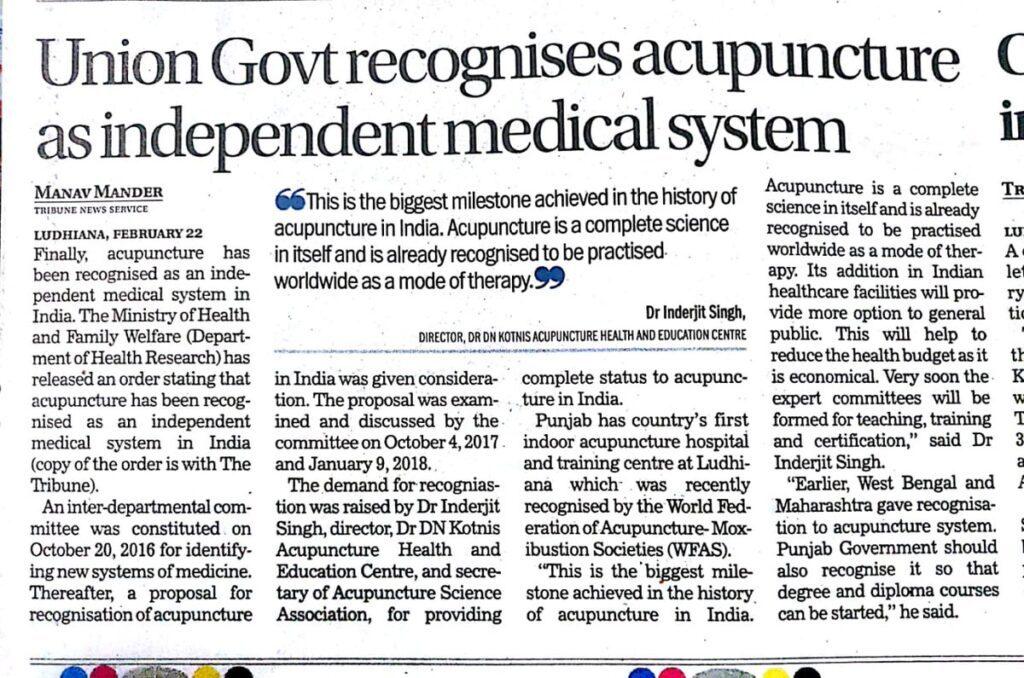7 Ways How Acupuncture in Bangalore can Change Your Life - Ultimate Guide

Author
Reviewed by Dr Rudresh, MD, DM Chiro (Sweden), CDC (USA) | Europe-Certified Chiropractor
Acupuncture in Bangalore-Ultimate Guide
Introduction
Are you feeling overwhelmed, stressed, or in pain? Acupuncture in Bangalore, an ancient healing technique originating in China, could offer relief. More and more Bangalore residents are turning to this alternative medicine practice to improve their well-being.

What is Acupuncture?
Acupuncture involves inserting sterile and thin needles into various points over your body to stimulate energy flow (chi or qi) along meridians. Practitioners believe this energy flows freely in a balanced body but gets blocked in an imbalanced one, leading to physical and mental disorders. Acupuncture aims to unblock chi and restore balance.
How Acupuncture in Bangalore Can Change Your Life
Here is a step-by-step guide that answers how acupuncture treatments in Bangalore can help you change your life by making you healthy and fit naturally:
- Relieve chronic pain conditions: Acupuncture treatments from experienced acupuncturists in Bangalore can effectively relieve chronic pain conditions like lower back pain, neck pain, migraine headaches, and arthritis pain.
- Improve your mental health: Acupuncture helps reduce anxiety, depression, sleep disorders, and stress. It balances mood by releasing feel-good hormones in the body.
- Boost energy levels: By improving blood circulation, removing blockages in meridians, and regulating the body’s vital energy, Acupuncture can enhance your energy levels and make you feel more alive.
- Increase fertility: Studies show Acupuncture may help boost fertility and increase the chances of conception in both men and women by balancing hormones and improving blood flow to reproductive organs.
- Manage various health conditions: From asthma to digestive disorders to PCOS, Acupuncture has been shown to relieve symptoms and manage various health conditions effectively.
- Slow down aging: Regular acupuncture treatments can slow down the aging process by improving cell function, boosting collagen production, and enhancing the immune system.
- Give you an overall sense of well-being: By restoring the balance of energy in your body and relieving stress and pain, Acupuncture helps improve overall well-being, happiness, and quality of life.
How Does Acupuncture Work?
The needles stimulate the release of chemicals in the brain, spinal cord, and muscles that affect the sensations of pain and relaxation. They also activate the body’s self-healing abilities. While the exact mechanisms of action are not fully understood, studies have shown that Acupuncture:
- Increases blood flow
- Reduces inflammation
- Affects the limbic system controlling emotions
Acupuncture in Bangalore
History of Acupuncture
Acupuncture originated over 3,000 years ago in ancient China and spread throughout Asia. It is an important component of traditional Chinese medicine. In modern times, Acupuncture has gained mainstream acceptance as a treatment option.
Acupuncture has become very popular in cities like Bangalore due to worsening health conditions. This can be attributed to pollution, traffic jams, long work hours, sedentary lifestyles, excess work stress, junk food, and side effects of allopathy drugs.

Benefits of Acupuncture in Bangalore
Pain Relief
Acupuncture can help:
- Relieve headaches
- Ease back and neck pain
- Alleviate joint and muscle pain
- Reduce symptoms of fibromyalgia and arthritis
Stress Relief
Studies show:
- Acupuncture lowers cortisol levels and promotes relaxation
- It can reduce symptoms of stress, anxiety, and depression
- Many patients report feeling more calm and balanced
Fertility Treatment
Acupuncture improves blood flow to the reproductive organs, which can aid fertility.
Weight Loss
Acupuncture at specific points helps regulate metabolism and aids in weight loss.
Types of Acupuncture Techniques in Bangalore
The main types used are:
- Traditional Chinese Acupuncture – Follows the ancient methods
- Japanese Acupuncture – Focuses on the harmony of body and mind
- Korean Acupuncture – Combines Acupuncture with massage and herbs
- Auricular Acupuncture – Targets points on the outer ear
- Electroacupuncture – Uses electric current along with needle insertion
What Conditions Acupuncture Can Treat
Pain Relief
Back pain, neck pain, sciatica pain, shoulder pain, knee pain, headache, migraines, etc.
Spine & Disc Problems
Slip disc, disc bulge, herniated discs, spondylitis, spondylosis, degenerative disc disease, etc.
Digestive Issues
IBS, acid reflux, gastritis, constipation.
Respiratory Conditions
Asthma and allergies.
Addictions
Drug addiction, smoking cessation, alcohol addiction, etc.
Autoimmune Disorders
Multiple sclerosis, psoriasis, ALS, rheumatoid arthritis.
What is Acupuncture Good For?
Acupuncture has been shown to provide relief for many conditions like:
- Pain (back, neck, knee, migraine headaches)
- Nausea (from chemotherapy, pregnancy, hangovers)
- Anxiety and depression
- Fertility issues
- Sleep disorders
- Weight loss
Finding an Acupuncturist in Bangalore
Finding the right acupuncturist is key. Look for someone who:
- Has proper certification in traditional Chinese medicine
- Has years of successful experience treating your condition
- Takes time to listen and personalize treatments
Make sure to ask about the following:
- Treatment costs – On average, an initial consultation costs ₹500 and follow-up sessions ₹500 to ₹1000 in Bangalore.
- Insurance coverage – Some plans cover Acupuncture (if you have group insurance, AcuSTAR provides an estimated/actual treatment bill that you can claim later on)
Acupuncture Treatment Process
During your first session, the acupuncturist will:
- Take your medical history
- Ask about your symptoms and lifestyle
- Examine your tongue, pulse, and body
- Create a tailored treatment plan
Subsequent sessions involve needle insertion at specific acupuncture points for 20 to 30 minutes. You’ll likely feel a dull ache, heaviness, or tingling as the needles activate your energy pathways.
Effectiveness of Acupuncture in Bangalore
Many scientific studies have found Acupuncture effective for:
- Pain relief – As effective as pain medications for many conditions
- Fertility – Increasing pregnancy rates and live births in IVF patients
However, research on Acupuncture for anxiety, depression, and weight loss shows mixed results.
Acupuncture Bangalore - Google Reviews
Visit here to check actual patients' reviews of acupuncture treatments from AcuSTAR Wellness Clinic located in Jakkuru, Nagarabhavi, Bangalore.
Real-Life Success Stories of Patients from Bangalore
Here are 10 real-life success stories of patients benefiting from Acupuncture in Bangalore:
- Suman, 28, Bangalore – “The Acupuncture helped relax my body and mind. Within a few weeks, my migraines and chronic tension headaches became less frequent and less severe.”
- Rahul, 36, Bangalore – “After years of back pain, acupuncture combined with exercises recommended by my therapist finally provided much-needed relief.”
- Anjali, 34, Bangalore – “After trying for two years, acupuncture treatments helped me conceive my first child. I will always be grateful.”
- Priyanka, 27, Bangalore – “The Acupuncture really helped reduce my anxiety symptoms. I felt calmer and more grounded after each session.”
- Rajesh, 43, Bangalore – “I was skeptical at first, but the Acupuncture really helped relieve my knee pain from a past injury. I’m back to playing sports!”
- Shruti, 29, Bangalore – “Acupuncture jumpstarted my weight loss journey. Combined with a healthier diet, I lost 15 kgs in 6 months and kept it off.”
- Vijay, 46, Bangalore – “After months of various medications, acupuncture finally provided effective relief for my chronic shoulder pain.”
- Neha, 38, Bangalore – “I was surprised how quickly acupuncture eased my morning sickness and fatigue during my first pregnancy.”
- Ajay, 51, Bangalore – “My depression and insomnia greatly improved after just a few acupuncture treatments. I feel like a new person.”
- Kiran, 39, Bangalore – “Within weeks of Acupuncture, my frequent migraines reduced to almost zero. It really worked wonders for me.”
Are There Any Possible Adverse Side Effects or Risks Associated with Acupuncture?
Yes, there are a few potential side effects and risks associated with Acupuncture:
- Bruising and bleeding: This is common, especially if the needles remain in place for an extended period.
- Infection: Improperly sterilized needles can spread infections, though this is rare when sterile, disposable needles are used properly.
- Fainting: Some people experience fainting or dizziness during or after treatment, especially the first few times.
- Broken needles: Needles can break under the skin, though this is uncommon when done properly by an experienced practitioner. Broken needles may need to be surgically removed.
- Nerve damage: There is a small risk of harm to nerves near the acupuncture points, which can cause pain, numbness, or tingling. This is more likely with inexperienced practitioners.
- Organ puncture: There is a minimal risk of puncturing an organ, especially when needling the abdomen. This risk is low when done properly.
- Acute injuries: Falling due to dizziness or fainting during treatment could cause acute injuries.
- Aggravation of symptoms: In rare cases, Acupuncture can worsen existing symptoms instead of improving them.
Generally, side effects are minor and temporary when Acupuncture is performed by trained, experienced practitioners using sterile techniques. However, as with any medical procedure, there are inherent risks. Researching your practitioner’s qualifications, licensure, and experience before undergoing acupuncture treatments is important.
Pro Tip: Always choose a licensed and experienced acupuncturist to ensure safe and effective treatment.
Finding the Best Acupuncture Clinics in Bangalore
Choosing the right acupuncture clinic is crucial to ensure safety, effectiveness, and positive results. Here are some tips for finding a reputable acupuncture center in Bangalore:
- Research and select reputable acupuncture clinics
- Check online reviews and ratings from platforms like Google and Lybrate. Look for consistency in positive feedback.
- Ask, if possible, for references and recommendations from close friends, family, and your primary care physician. They may know of reputable clinics based on their own experiences.
- Check with regulatory bodies like the Medical Council of India to confirm the clinic’s credentials and certifications are in order.
- Avoid clinics that make exaggerated claims or promise miraculous results. Go for a trusted and established name.
Factors to Consider When Choosing an Acupuncture Center
- Experience: Consider clinics with acupuncturists with many years of experience treating various conditions.
- Credentials: Make sure the clinic’s acupuncturists hold proper degrees from approved institutions of traditional Chinese medicine.
- Reputation: A good clinic will have a positive reputation built over years of patient satisfaction and good outcomes.
- Resources: Larger, well-established clinics tend to have more advanced resources and facilities.
- Services: What additional services like herbal therapy, chiropractic, and dietary advice does the clinic offer?
- Costs: Understand the costs for initial consultations and follow-up sessions. Find a clinic you’re comfortable with financially.
Understanding the Qualifications and Expertise of Acupuncturists in Bangalore
Look for acupuncturists who have:
- An undergraduate degree in traditional Chinese medicine
- A postgraduate diploma or master’s degree in Acupuncture
- Years of clinical experience treating a range of conditions
- Membership in a recognized professional association
- Experience with specific conditions you’re seeking treatment for
The Acupuncture Process and What to Expect in Bangalore
Understanding what happens during acupuncture treatments in Bangalore can help manage your expectations and ensure a positive experience.
Initial Consultation and Assessment
Your first visit to an acupuncture clinic typically involves:
- Providing medical history and details about your condition
- Undergoing a physical examination focusing on traditional Chinese medicine
- Discussing your treatment goals and lifestyle factors
- Creating a customized treatment plan
The initial consultation helps the acupuncturist determine your condition’s appropriate acupuncture points and techniques.
Acupuncture Techniques Commonly Used in Bangalore
- Traditional Acupuncture using thin, sterile needles at specific points
- Electroacupuncture – Adding a low electrical current through the needles
- Moxibustion – Indirect stimulation using heat from burning mugwort
- Cupping – Using glass cups to create suction and increase blood flow
The techniques used depend on your condition, symptoms, and treatment goals.
Safety Precautions and Possible Side Effects
To ensure safety:
- Ask about the clinic’s sterilization and hygiene procedures
- Inform the practitioner of any medical conditions or medications
- Tell them if you have a fear of needles
Possible side effects include:
- Bruising and mild pain at insertion points
- Feeling tired, lightheaded, or nauseous
- Temporary aggravation of symptoms
Serious side effects are rare when performed properly. Trusted acupuncture clinics in Bangalore maintain the highest safety, hygiene, and sterilization standards.

FAQs about Acupuncture in Bangalore
Yes, when you consult and take acupuncture treatment in Bangalore from reputed and experienced, KPME-Registered and KSDC-licensed acupuncturists like Dr. Rudresh.
The number of acupuncture sessions varies depending on your condition and treatment goals. On average, 6 to 12 sessions are initially recommended.
Some patients report feeling no sensation, while others think tingling, heaviness, or a dull ache. The sensation usually subsides as the treatment progresses.
Generally not. However, inform your acupuncturist about all medications and supplements you’re taking.
The results of one acupuncture session typically last 2 to 4 weeks. Ongoing treatments at regular intervals work best to sustain relief.
Acupuncture costs around ₹800 to ₹2,500 per session in India, depending on the city and practitioner. An initial consultation typically costs around ₹1,500.
20 minutes is on the shorter side for acupuncture. Most treatments last 30-60 minutes for optimum results. However, 20 minutes can still provide some benefits.
It is generally not recommended to have acupuncture every day. Having it 2-3 times a week is more common, especially at the start of treatment. Daily acupuncture is best only under the supervision of your practitioner.
Once a month acupuncture may be enough for maintenance, depending on your condition. However, for more serious or chronic issues, twice a week or weekly treatments are often needed initially.
The average cost per acupuncture treatment session ranges from ₹800 to ₹2,500 in India. Initial consultations cost around ₹1,500 on average.
For some conditions like maintenance for wellness or stress relief, monthly acupuncture can be effective. However, for more serious issues, weekly or biweekly treatments are often needed at first and then spacing out sessions over time.
The number of acupuncture treatments needed varies from person to person and condition to condition. Some people see results after a few sessions, while others may need 6-12 treatments spaced out over weeks or months.
The effects of a single acupuncture treatment typically wear off within 2-4 weeks. Ongoing treatments every 1-2 weeks help sustain the benefits longer.
Studies show acupuncture is 60-90% effective for treating various conditions like pain, nausea, and anxiety. The success rate depends on the condition, practitioner experience, and number of treatments.
While some people notice immediate benefits after acupuncture, for most it takes multiple sessions over time to experience results. Acupuncture works by promoting the body’s natural healing functions.
Yes! Numerous studies have found acupuncture effective for relieving lower back pain. It helps increase blood flow, relax muscles, and reduce inflammation.
Some clinical trials suggest acupuncture may aid weight loss when combined with lifestyle changes like diet and exercise. However, more research is still needed.
Many people report feelings of deep relaxation, reduced muscle tension, and mental clarity after acupuncture. Some also experience drowsiness. Any initial discomfort from the needles usually fades during the treatment.
You may benefit from acupuncture if you have chronic pain, stress, anxiety, or other conditions that haven’t responded well to traditional medications.
While acupuncture can provide lasting relief for some people, for most the benefits reduce over time. Ongoing treatments are often needed to sustain the effects.
The effects of a single acupuncture treatment typically wear off within 2-4 weeks. However, a course of regular treatments over weeks to months can produce longer-lasting benefits for some people.
Yes! Numerous studies have found acupuncture can reduce symptoms of mild to moderate anxiety. It may also help prevent anxiety from becoming chronic or severe.
While acupuncture aims to restore overall balance and well-being, there is insufficient research to show that it can directly prevent illnesses like the common cold or flu.
Yes! Acupuncture has been found in studies to be effective at relieving many types of nerve pain including sciatica, carpal tunnel syndrome, and diabetic neuropathy.
